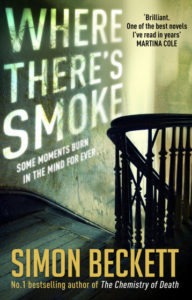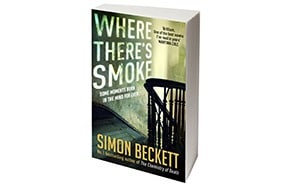Features
Simon Beckett: Fine-tuning the past
When a book is published, that’s usually the end of it as far as the author’s concerned. Job done, move onto the next. Years pass, more books are written, and the 100,000 words, with its story and characters that filled most of your working day, recedes into the past.
Or not.
When my editor suggested updating Where There’s Smoke, I was initially reluctant. The novel, my third, was first published in 1997, and was my first attempt to write a commercial crime thriller. The idea for it came after I read a news item, about a surrogate mother who refused to hand over her baby to the couple who’d paid her to become pregnant. That started me wondering what might happen if a woman hired someone to be the father of her child. It seemed to me that, under certain circumstances, there was potential for things to go spectacularly wrong.
My aim was to write a gripping thriller that followed a normal life’s descent into nightmare and chaos, and that would appeal to men as much as women. At the time the book was well received, and was adapted into a major two-part drama for ITV. But by now it was almost twenty years old, and while I was pleased that readers of my David Hunter forensic crime series would have the chance to read one of my backlist titles, I knew that successfully updating it to 2015 would be no small task.
For one thing, society and technology had changed in the intervening years. When I first sat down to write Smoke, fax machines were still regarded as high-tech, mobile phones were the size of housebricks and the internet and email were only just appearing on the horizon. Now all these aspects would somehow have to be introduced into the plot in a way that seemed natural and unforced.
 Then there was the research. Although it was primarily a thriller, the original version of Where There’s Smoke had involved extensive background digging, not only into the legal and practical aspects of donor insemination, but also into arson and pyromania. Changes to the law and new developments in science and medicine since then meant that I would have to check every fact and detail all over again.
Then there was the research. Although it was primarily a thriller, the original version of Where There’s Smoke had involved extensive background digging, not only into the legal and practical aspects of donor insemination, but also into arson and pyromania. Changes to the law and new developments in science and medicine since then meant that I would have to check every fact and detail all over again.
It was a daunting prospect. Many of these changes would have a radical impact on the story, and integrating them would involve more than simply taking out references to smoking in bars and offices, or replacing faxes with emails. There was also a practical problem: since I didn’t have the original text as a Word file, it meant laboriously working through an old copy of the actual book itself.
But once I started looking at what needed to be done, I saw it was an opportunity to not just update the novel, but improve it as well. As with everything I’ve written, there were always parts of it I looked back on later and thought I could do better. Now I had the chance. And I soon realised that many of the technological developments of the past twenty years could actually enhance the story.
Back in 1997, social networking meant a few drinks with colleagues and clients after work, and social media sites like Facebook and Twitter didn’t exist. Now, love them or hate them, they’re so ubiquitous that they’re taken for granted. And for someone like Kate, the book’s main character who runs her own PR and marketing company, they’re an essential tool of the trade. Of course, the flip side is that they can also be used against you. Concepts like hacking and trolling weren’t available to me when I wrote Where There’s Smoke, yet now I could use them to heighten the tension and drama in a way I would never have envisaged twenty years ago.
The process was painstaking and time consuming. It’s amazing how many times it’s possible to go over a text and still miss a throwaway mention of someone lighting up in public, or picking up a telephone receiver rather than handset or mobile. More than once I felt like banging my head against a wall, after discovering that a tiny change I’d made in an early chapter had a knock-on effect that rippled throughout the entire book.
But it was also rewarding, not least because it showed me how my writing has changed over the past two decades. For the better, I hope. By the end, I felt I’d made a somewhat dated novel into a tense and relevant thriller that would be enjoyed by contemporary readers. As to whether I’d do it again with my other backlist titles…
That’s another story.
1 Comment
Join the discussion
Please note: Moderation is enabled and may delay your comment being posted. There is no need to resubmit your comment. By posting a comment you are agreeing to the website Terms of Use.


Hi Mr Beckett its time for a Dr David Hunter novel it’s been years.you have a cool talent please more of Dr Hunter the are the best thriller’s I have read you owe us